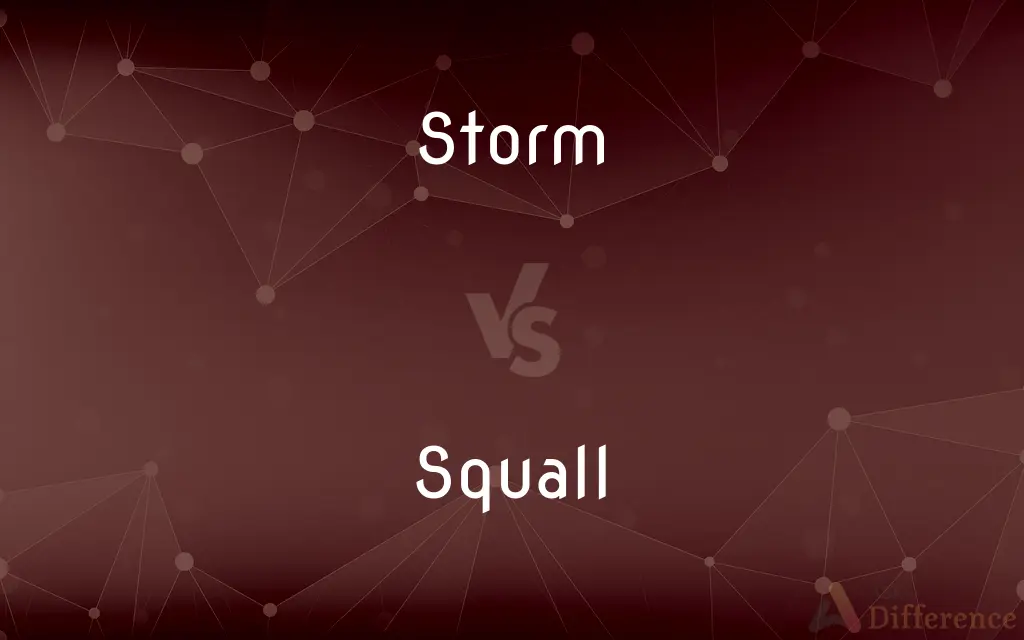Storm vs. Squall — What's the Difference?
By Fiza Rafique & Urooj Arif — Updated on March 30, 2024
A storm is a severe weather condition with strong winds, rain, thunder, and lightning, while a squall is a sudden, sharp increase in wind speed lasting minutes.

Difference Between Storm and Squall
Table of Contents
ADVERTISEMENT
Key Differences
A storm encompasses a wide range of severe weather phenomena, including thunderstorms, hurricanes, and blizzards, characterized by strong winds, precipitation, and often thunder and lightning. It represents a significant meteorological event that can affect large areas and last for hours to days. Squalls, on the other hand, are characterized by a sudden, sharp increase in wind speed, often accompanied by rain or snow, and are more short-lived, typically lasting for minutes rather than hours or days.
While storms can cause widespread damage and disruption, affecting everything from transportation to power supplies over a broad area, squalls are usually more localized and brief, though they can still be intense and dangerous, especially for ships at sea or planes in flight. Squalls are often associated with cold fronts, thunderstorms, or strong weather systems but do not have the sustained impact of larger storms.
The criteria for classifying weather events as storms include a combination of factors such as wind speed, type and amount of precipitation, and the presence of thunder and lightning. In contrast, squalls are specifically defined by a rapid increase in wind speed of at least 16 knots, reaching a peak speed of 22 knots or more and lasting for at least one minute.
Meteorologists use different scales and categories to measure and predict storms, such as the Saffir-Simpson Hurricane Wind Scale for hurricanes or the Enhanced Fujita Scale for tornadoes, highlighting their potential for prolonged and varied impact. Squalls, being more sudden and less variable, do not have such specific categorization but are critical in maritime and aviation weather forecasts for their potential to cause sudden, hazardous conditions.
Storms have broader climatic implications, contributing to precipitation patterns, affecting water cycles, and even influencing climate change. Squalls, while impactful, are more a feature of specific weather conditions rather than influencers of broader climate patterns. Their significance lies in their ability to cause sudden, sharp changes in weather conditions, necessitating swift responses to ensure safety, especially in navigation and aviation.
ADVERTISEMENT
Comparison Chart
Definition
A severe weather condition with strong winds and precipitation, possibly including thunder and lightning.
A sudden, sharp increase in wind speed, often associated with brief, intense weather conditions.
Duration
Hours to days.
Minutes.
Impact
Can cause widespread damage and affect large areas.
Usually localized but can be intense and dangerous.
Associated Weather
Includes thunderstorms, hurricanes, blizzards, etc.
Often associated with cold fronts or thunderstorms.
Measurement
Classified by wind speed, precipitation, thunder, and lightning presence.
Defined by a rapid increase in wind speed of at least 16 knots to a peak of 22 knots or more.
Compare with Definitions
Storm
Can include thunderstorms, characterized by thunder and lightning.
The summer thunderstorm brought heavy rain and lightning strikes.
Squall
Can cause sudden, intense weather conditions, important for aviation.
The plane experienced turbulence due to a squall.
Storm
Affects large areas and can have significant climatic implications.
The storm contributed to the region's worst flooding in decades.
Squall
Often accompanies a change in weather, like a cold front.
The squall brought a sudden drop in temperature and brief rain.
Storm
A severe weather event with strong winds and often precipitation.
The city prepared for the approaching storm with emergency measures.
Squall
Primarily a concern for navigation and immediate safety.
The captain navigated carefully, anticipating squalls as forecasted.
Storm
Hurricanes, defined by strong winds circulating around a low-pressure center.
The hurricane caused widespread devastation along the coast.
Squall
Defined by specific wind speed criteria.
The weather report warned of squalls reaching up to 30 knots.
Storm
Blizzards, storms with heavy snowfall and strong winds.
The blizzard shut down roads and airports, stranding travelers.
Squall
A sudden increase in wind speed, lasting minutes.
The boat was caught in a squall, challenging the sailors.
Storm
A storm is any disturbed state of an environment or in an astronomical body's atmosphere especially affecting its surface, and strongly implying severe weather. It may be marked by significant disruptions to normal conditions such as strong wind, tornadoes, hail, thunder and lightning (a thunderstorm), heavy precipitation (snowstorm, rainstorm), heavy freezing rain (ice storm), strong winds (tropical cyclone, windstorm), or wind transporting some substance through the atmosphere as in a dust storm, blizzard, sandstorm, etc.
Squall
A squall is a sudden, sharp increase in wind speed lasting minutes, contrary to a wind gust lasting seconds. They are usually associated with active weather, such as rain showers, thunderstorms, or heavy snow.
Storm
An atmospheric disturbance manifested in strong winds accompanied by rain, snow, or other precipitation and often by thunder and lightning.
Squall
A loud, harsh cry.
Storm
A wind with a speed from 48 to 55 knots (55 to 63 miles per hour; 89 to 102 kilometers per hour), according to the Beaufort scale. Also called whole gale.
Squall
A brief sudden violent windstorm, often accompanied by rain or snow.
Storm
A heavy shower of objects, such as bullets or missiles.
Squall
(Informal) A brief commotion.
Storm
A strong or violent outburst, as of emotion or excitement
A storm of tears.
Squall
To scream or cry loudly and harshly.
Storm
A violent disturbance or upheaval, as in political, social, or domestic affairs
A storm of protest.
Squall
To blow strongly for a brief period.
Storm
A violent, sudden attack on a fortified place.
Squall
(meteorology) A squall line, multicell line, or part of a squall line.
Storm
A storm window.
Squall
A sudden storm, as found in a squall line.
Storm
To blow with strong winds and usually produce copious rain, snow, or other precipitation
It stormed throughout the night.
Squall
A loud cry or wail.
Storm
To behave or shout angrily; rant and rage
Stormed at his incompetence.
Squall
To cry or wail loudly.
Storm
To move or rush tumultuously, violently, or angrily
Stormed up the embankment.
Stormed out of the room.
Squall
A sudden and violent gust of wind often attended with rain or snow.
The gray skirts of a lifting squall.
Storm
To assault or capture suddenly
The troops stormed the fortress.
Squall
A loud scream; a harsh cry.
There oft are heard the notes of infant woe, -The short, thick sob, loud scream, and shriller squall.
Storm
To travel around (a place) vigorously in an attempt to gain support
The candidates stormed the country.
Squall
To cry out; to scream or cry violently, as a woman frightened, or a child in anger or distress; as, the infant squalled.
Storm
To shout angrily
"Never!" she stormed.
Squall
Sudden violent winds; often accompanied by precipitation
Storm
Any disturbed state of the atmosphere, especially as affecting the earth's surface, and strongly implying destructive or unpleasant weather.
The boat was torn to pieces in the storm, and nobody survived.
Squall
Make high-pitched, whiney noises
Storm
A thunderstorm.
Squall
Utter a sudden loud cry;
She cried with pain when the doctor inserted the needle
I yelled to her from the window but she couldn't hear me
Storm
A violent agitation of human society; a civil, political, or domestic commotion; violent outbreak.
The proposed reforms have led to a political storm.
Squall
Blow in a squall;
When it squalls, a prudent sailor reefs his sails
Storm
(meteorology) A very strong wind on the wind scale, stronger than a gale, less than a hurricane (10 or higher on the Beaufort scale).
Storm
(military) A violent assault on a stronghold or fortified position.
Storm
(impersonal) (weather it) To be violent, with strong winds and usually rain, thunder, lightning, or snow.
It stormed throughout the night.
Storm
(intransitive) (metaphor) To rage or fume; to be in a violent temper.
Storm
To move quickly and noisily like a storm, usually in a state of uproar or anger.
She stormed out of the room.
Storm
(transitive) [army; crowd, rioters] To assault (a significant building) with the aim to gain power over it.
Troops stormed the complex.
The storming of the Bastille
Storm
(transitive) to assault, gain power over (heart, mind+).
Storm
A violent disturbance of the atmosphere, attended by wind, rain, snow, hail, or thunder and lightning; hence, often, a heavy fall of rain, snow, or hail, whether accompanied with wind or not.
We hear this fearful tempest sing,Yet seek no shelter to avoid the storm.
Storm
A violent agitation of human society; a civil, political, or domestic commotion; sedition, insurrection, or war; violent outbreak; clamor; tumult.
I will stir up in England some black storm.
Her sisterBegan to scold and raise up such a storm.
Storm
A heavy shower or fall, any adverse outburst of tumultuous force; violence.
A brave man struggling in the storms of fate.
Storm
A violent assault on a fortified place; a furious attempt of troops to enter and take a fortified place by scaling the walls, forcing the gates, or the like.
Storms beat, and rolls the main;O! beat those storms, and roll the seas, in vain.
What at first was called a gust, the sameHath now a storm's, anon a tempest's name.
Storm
To assault; to attack, and attempt to take, by scaling walls, forcing gates, breaches, or the like; as, to storm a fortified town.
Storm
To raise a tempest.
Storm
To blow with violence; also, to rain, hail, snow, or the like, usually in a violent manner, or with high wind; - used impersonally; as, it storms.
Storm
To rage; to be in a violent passion; to fume.
The master storms, the lady scolds.
Storm
A violent weather condition with winds 64-72 knots (11 on the Beaufort scale) and precipitation and thunder and lightening
Storm
A violent commotion or disturbance;
The storms that had characterized their relationship had died away
It was only a tempest in a teapot
Storm
A direct and violent assault on a stronghold
Storm
Behave violently, as if in state of a great anger
Storm
Take by force;
Storm the fort
Storm
Rain, hail, or snow hard and be very windy, often with thunder or lightning;
If it storms, we'll need shelter
Storm
Blow hard;
It was storming all night
Storm
Attack by storm; attack suddenly
Common Curiosities
What is a storm?
A storm is a significant weather event characterized by strong winds, precipitation, and potentially thunder and lightning, affecting large areas and lasting for extended periods.
What types of storms are there?
Types of storms include thunderstorms, hurricanes, blizzards, and tornadoes, each with distinct characteristics and impacts.
Can squalls occur without precipitation?
Yes, squalls can occur with or without precipitation; they are primarily defined by the sudden increase in wind speed.
How do storms and squalls differ in impact?
Storms can cause widespread, prolonged damage and disruption, while squalls are more localized and brief but can still pose significant danger, especially to navigation and aviation.
What safety precautions are important during a squall?
During a squall, it's important to seek shelter, reduce speed if driving or sailing, and avoid flying objects if outside, due to the sudden increase in wind speed.
How are storms measured or categorized?
Storms are measured and categorized by scales based on wind speed, precipitation, and other factors, such as the Saffir-Simpson Hurricane Wind Scale for hurricanes.
Why are squalls significant for sailors and pilots?
Squalls are significant because they can cause sudden, severe weather changes, requiring immediate adjustments to ensure safety in navigation and flight.
What is a squall?
A squall is a sudden, sharp increase in wind speed, often accompanied by brief but intense weather conditions, lasting for minutes.
How can one prepare for a storm?
Preparations for a storm can include securing property, stocking up on essentials, and staying informed through weather forecasts and advisories.
Are all storms dangerous?
While not all storms cause damage, they have the potential to be dangerous due to strong winds, heavy precipitation, and other severe weather elements.
Can storms affect climate change?
Yes, storms can influence climate change by altering precipitation patterns and temperatures, and severe storms may become more frequent with global warming.
Do storms have any benefits?
Yes, storms can contribute to water cycles by providing significant precipitation, which can replenish groundwater and reservoirs, despite their potential for destruction.
How long does a squall last?
A squall typically lasts for minutes, making it a brief but intense weather phenomenon.
What causes squalls?
Squalls are often caused by cold fronts, thunderstorms, or rapid changes in atmospheric conditions that lead to a sharp increase in wind speed.
How do meteorologists predict squalls?
Meteorologists predict squalls by analyzing weather patterns, radar data, and atmospheric conditions that indicate the potential for sudden wind speed increases.
Share Your Discovery

Previous Comparison
Understand vs. Understanding
Next Comparison
Sweety vs. SweetAuthor Spotlight
Written by
Fiza RafiqueFiza Rafique is a skilled content writer at AskDifference.com, where she meticulously refines and enhances written pieces. Drawing from her vast editorial expertise, Fiza ensures clarity, accuracy, and precision in every article. Passionate about language, she continually seeks to elevate the quality of content for readers worldwide.
Co-written by
Urooj ArifUrooj is a skilled content writer at Ask Difference, known for her exceptional ability to simplify complex topics into engaging and informative content. With a passion for research and a flair for clear, concise writing, she consistently delivers articles that resonate with our diverse audience.
















































